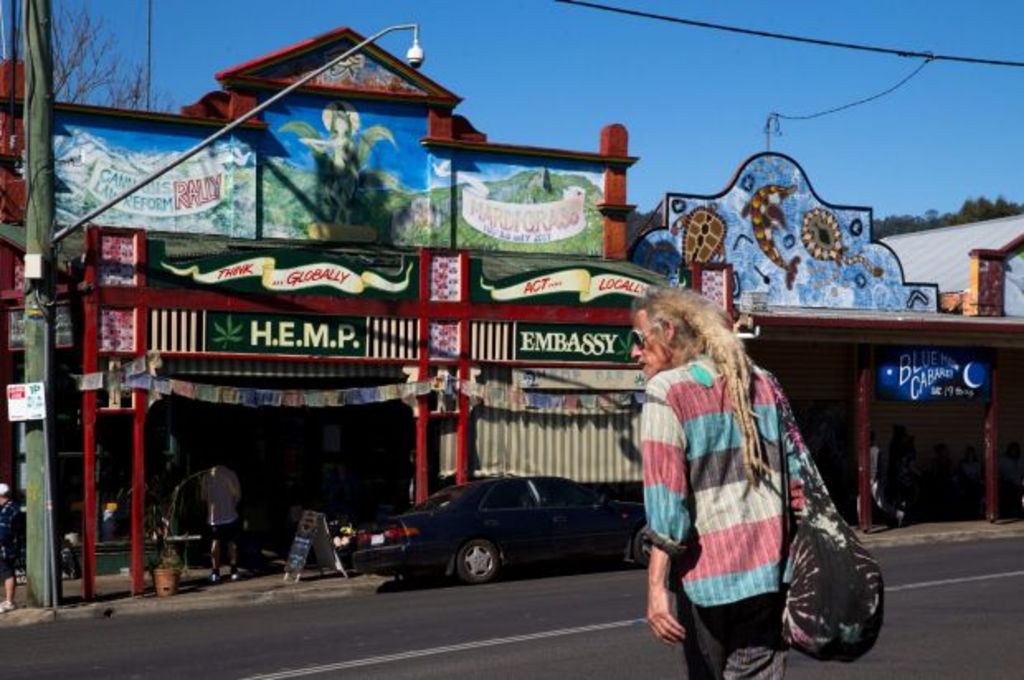
Is there more to the NSW town of Nimbin than hippies, hemp and high times?
Nimbin, the town in northern NSW renowned for alternative living and pot-smoking, is celebrating 25 years since the first Mardigrass.
Dubbed a “protestival”, with the slogan “The law is the crime, not the plant!”, Mardigrass-goers can attend events including “hemp olympix” joint-rolling competitions, a hash “suppositorium”, and stoned chess championships.
Dubbed Australia’s alternative lifestyle capital, visitors to Nimbin could be forgiven for wondering if there’s more to the place than hippies, hemp and getting high.
Nimbin wasn’t always this way. About 40 kilometres west of Byron Bay and with a population of about 1500, it was originally a dairying village. The lush surrounding farmland is still home to generations-old farms.
In 1973, Nimbin hosted the Aquarius Festival, which brought together alternative thinkers from across Australia. Some stayed on, implementing the lifestyle vision that has shaped the current community.
Diana Roberts has lived in the area for 33 years. In 1990, she opened Nimbin Apothecary – a dispensary for plant-based remedies – and still works there, despite not a cannabis user herself.
Roberts says that most people come to Nimbin for the environment rather than the drug culture. “I don’t think you get offered drugs in the same way anymore. There have been massive police crackdowns in the past couple of years,” she says.
- Related: Fast train to serenity
- Related: Sydneysiders flock to Nimbin
- Related: Australians living in “intentional communities”
As for people who call Nimbin home, Roberts describes them as highly educated and hard-working. “So many people here have built their own houses … and worked their land, grow their food.”
Would she describe them as hippies? “If you consider hippies in a derogatory sense, as people who drop out and do nothing with their lives, then nothing’s further from the truth.
“But if you look at hippies as being people who challenge the dominant paradigm, I think that’s very much what post-Aquarian Nimbin was founded on – people looking for different values, a different lifestyle – something more connected with the earth and the environment.”
This is still the community’s ethos. “People care about the planet … they’re trying not to be consumers, they’re trying to live as sustainable a lifestyle as possible,” she says. “That’s the bond we all have in Nimbin.”
Kylie Cain, who moved to the area with her partner 17 years ago, agrees that sustainable living philosophies unite the community. “The aspirations of the Aquarius festival are still being lived in the hills,” she says. “The idea of hippie is sustainability – it’s living within your means and with your environment … The people that live here care about the earth.”
Cain, who used to smoke cannabis but doesn’t any more, says that while Nimbin is known as “the pot capital of Australia”, there is much more beneath the surface.
People come from all over the world to do courses at Nimbin’s permaculture gardens, she says, and it is home to Rainbow Power Company, the oldest solar company in Australia.
Nimbin hosts a poetry competition each year, art exhibitions in spring and autumn, and colourful farmers’ markets twice a week.
Cain, who owns The Green Bank – a store on Nimbin’s main street offering holistic therapies and locally-made crafts – says the community is brimming with clever, creative and generous people.
“Before we arrived, they raised enough funds to buy the community centre … And the community has just done it again [for] a project that’s going to be a sustainability house,” she says. “There’s not many communities that can raise funds for projects like that, that are the size we are.”
Cain says “there’s richness in the community that I’ve never experienced anywhere else. We’ve had children since being here, and I know that my kids are safe all the time.”
She agrees with Roberts that the environment is Nimbin’s greatest asset. “I really love the land – it has an incredible energy. That’s what called me here, and it’s what calls a lot of people here. Here is where my heart is.”
